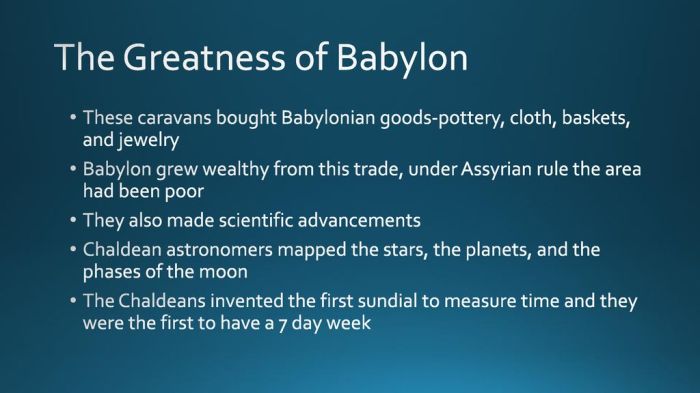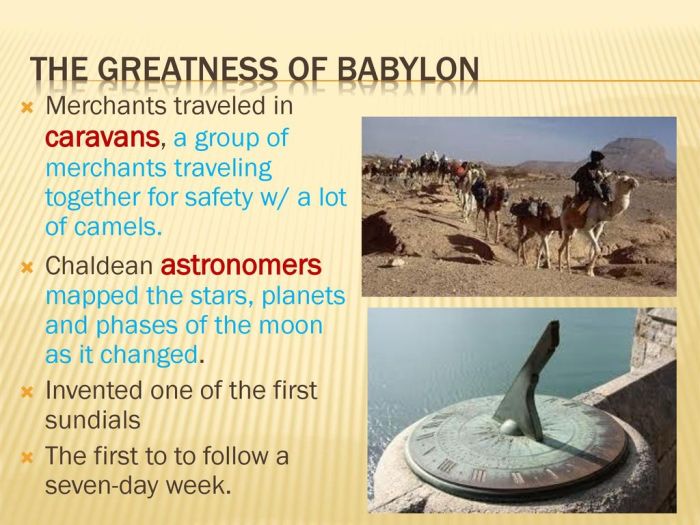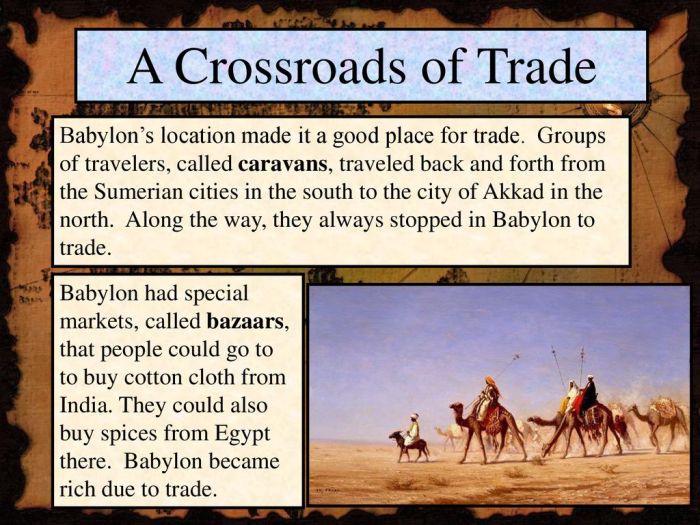How could caravans passing through Babylon be helped by astronomers? In the heart of ancient Mesopotamia, astronomers played a pivotal role in the success of these intrepid travelers, providing them with the celestial knowledge to navigate treacherous deserts, predict weather patterns, and understand cultural and religious practices.
From star charts to astrological insights, astronomers were indispensable guides for caravans traversing the Silk Road, ensuring their safe passage through the vast and enigmatic landscapes of the ancient world.
Navigational Assistance
Astronomers played a pivotal role in assisting caravans passing through Babylon by providing accurate star charts for navigation. These charts depicted the positions of stars and constellations, enabling travelers to determine their location and navigate their course.
Celestial Bodies as Landmarks
- Caravans relied on celestial bodies as landmarks, particularly the North Star (Polaris), which remained fixed in the northern sky. By observing the North Star, travelers could determine the direction of true north, essential for accurate navigation.
- Other celestial bodies, such as the Sun and Moon, also served as landmarks. By tracking the Sun’s position throughout the day, caravans could estimate the time and determine their approximate location.
Star Maps and Celestial Observations
Astronomers created detailed star maps that caravans could use to identify specific stars and constellations. These maps allowed travelers to navigate even in unfamiliar territories by comparing the observed night sky to the star charts.
Celestial observations also provided information about the time of year and the upcoming seasons. This knowledge helped caravans plan their journeys accordingly, avoiding periods of extreme weather or seasonal hazards.
Weather Forecasting

Astronomers in Babylon were skilled in predicting weather patterns based on celestial observations. They studied the movement of clouds, wind patterns, and the behavior of certain stars and planets.
Predicting Storms and Weather Patterns
- Astronomers could forecast the likelihood of storms, heavy rain, or sandstorms by observing the behavior of clouds and the positions of certain stars.
- They also used the Moon’s phases to predict weather patterns. For example, a new Moon was often associated with clear skies, while a full Moon could indicate potential rain.
Caravan Safety and Efficiency
Accurate weather forecasts were crucial for caravan safety and efficiency. By knowing when to expect inclement weather, caravans could adjust their travel plans, seek shelter, or delay their departure to avoid potential dangers.
For example, if astronomers predicted a sandstorm, caravans could choose to delay their journey until the storm passed or take an alternative route to avoid the affected area.
Timekeeping and Scheduling
Precise timekeeping was essential for caravans traveling long distances. Astronomers in Babylon developed methods to determine the time using celestial observations.
Celestial Observations for Timekeeping, How could caravans passing through babylon be helped by astronomers
- Astronomers used sundials to measure the Sun’s position and determine the time of day.
- They also observed the Moon’s phases and the positions of stars to estimate the time of night.
Caravan Planning and Scheduling
Accurate timekeeping allowed caravans to plan their rest stops, camp schedules, and travel itineraries. By knowing the time, caravans could ensure they arrived at suitable resting places at appropriate intervals.
They could also adjust their travel speed to reach their destination on time or make necessary adjustments to avoid traveling at night or during unfavorable weather conditions.
Astronomical Phenomena and Navigation

Astronomical phenomena, such as eclipses and solstices, held significance for caravan navigation.
Predicting and Interpreting Phenomena
- Astronomers could predict the occurrence of eclipses and solstices based on their knowledge of celestial movements.
- They understood the implications of these phenomena and could interpret their meaning for travelers.
Guiding Caravan Routes and Decisions
Astronomical events influenced caravan routes and travel decisions. For example, during a solar eclipse, caravans might pause their journey to observe the phenomenon and perform rituals or ceremonies.
Solstices marked the longest and shortest days of the year, which affected the duration of daylight available for travel. Caravans could adjust their schedules accordingly to optimize their travel time.
Cultural and Religious Practices

Celestial bodies held cultural and religious significance for the people accompanying the caravans.
Astrological Beliefs and Practices
- Astronomers could provide insights into astrological beliefs and practices, such as the influence of stars and planets on human affairs.
- Caravans often consulted with astronomers to determine auspicious times for travel and other important events.
Caravan Rituals and Ceremonies
Astronomical knowledge influenced caravan rituals and ceremonies. For example, caravans might perform ceremonies to honor specific stars or constellations or to seek protection during their journey.
Astronomers could guide these ceremonies by providing information about the positions and movements of celestial bodies.
Top FAQs: How Could Caravans Passing Through Babylon Be Helped By Astronomers
How did astronomers assist caravans with navigation?
Astronomers provided star charts and taught travelers how to use celestial bodies as landmarks, enabling them to navigate vast and unfamiliar landscapes.
What role did astronomers play in weather forecasting?
Astronomers observed celestial patterns to predict weather conditions, helping caravans avoid storms and plan their journeys accordingly.
How did astronomers contribute to timekeeping for caravans?
Astronomers used celestial observations to determine accurate time, allowing caravans to plan rest stops, camp schedules, and travel itineraries.
In what ways did astronomical phenomena influence caravan travel?
Astronomers could predict eclipses and solstices, which served as important navigational markers and influenced caravan routes and travel decisions.